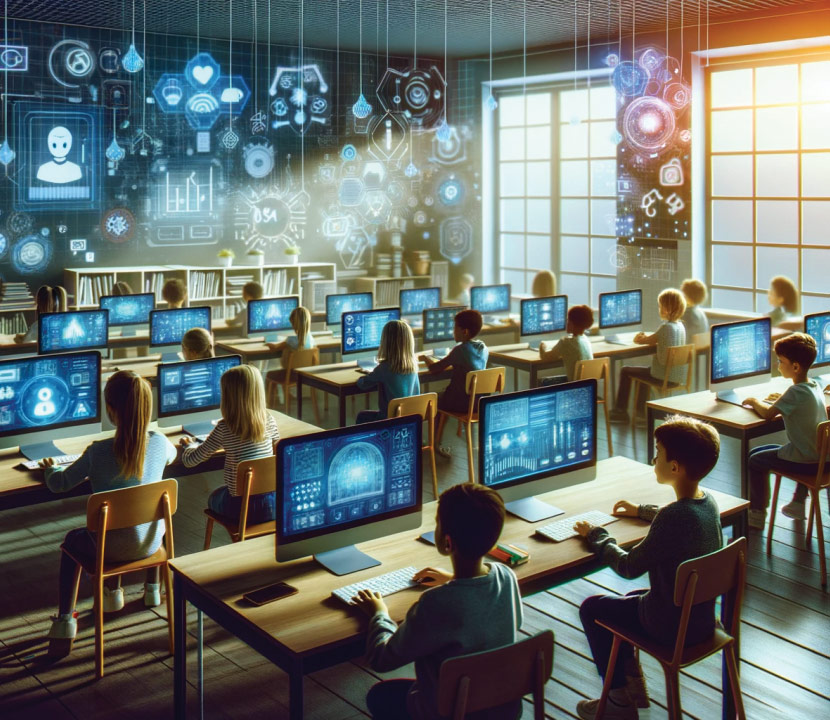Unlocking the Future of Learning: The Impact of AI on Education

In the ever-evolving landscape of education, the integration of Artificial Intelligence (AI) has become a transformative force that promises to reshape the way our children learn and grow. As we peer into the future, it’s evident that AI is not just a technological marvel but a powerful tool that could redefine the very fabric of education.
AI in the Classroom
One of the most immediate impacts of AI in education is its presence in the classroom. AI technologies have the potential to personalise the learning experience for each student. Platforms such as DreamBox and Knewton, for instance, utilise AI algorithms to tailor lessons based on individual progress, adapting to the pace and learning style of each student. This provides targeted support and challenges, fostering a deeper understanding of subjects and keeping students engaged and motivated.
Furthermore, AI can assist teachers by automating administrative tasks, allowing them more time to focus on the unique needs of their students. Tools like Squirrel AI and Carnegie Learning offer AI-driven solutions for grading, attendance tracking, and lesson planning, enhancing overall efficiency in the teaching process. However, it’s important to note that the role of the teacher remains irreplaceable. AI should be viewed as a supportive tool rather than a substitute for human interaction and guidance. The emotional intelligence and nuanced understanding that teachers bring to the classroom are crucial components of the learning process.
AI at Home: A Learning Ally for Parents
The influence of AI extends beyond the school gates and into our homes. As parents, navigating the digital landscape of education can be both exciting and overwhelming. AI offers a range of possibilities to support and enhance your child’s learning experience.
Educational apps powered by AI, such as Duolingo and Smartick, can provide personalised lessons, allowing children to reinforce what they’ve learned in school. These apps adapt to the child’s progress, identifying areas that need additional attention and presenting information in engaging ways. It’s like having a virtual tutor at your fingertips, available anytime, anywhere.
Moreover, AI can facilitate a more informed and collaborative approach between parents and teachers. Platforms like ClassDojo and ParentSquare use AI to streamline communication and share insights into a child’s academic performance, strengths, and areas that may need improvement. This proactive involvement allows parents to play a more active role in their child’s education journey.
Nurturing Critical Thinking and Creativity
One of the concerns often associated with the rise of AI in education is the fear of a robotic, standardised approach to learning. However, the true potential lies in harnessing AI to cultivate essential skills such as critical thinking and creativity.
AI platforms like IBM Watson Education and Quillionz can present students with complex problems, encouraging them to think critically and develop innovative solutions. By automating routine tasks, AI frees up time for educators to focus on guiding students through projects that demand creativity, collaboration, and problem-solving skills. This prepares them not just for exams but for the challenges they will face in the real world.
Addressing Concerns: Privacy and Ethical Considerations
As we embrace the possibilities of AI in education, it’s crucial to address concerns related to privacy and ethics. Parents should advocate for transparent policies regarding data collection and usage. Schools and education providers must prioritise the security of personal information, ensuring that sensitive data remains confidential and is used solely for educational purposes.
Moreover, the integration of AI should be approached with a commitment to fostering inclusivity. Efforts should be made to bridge the digital divide, ensuring that all students, regardless of socio-economic backgrounds, have access to the benefits of AI in education.
Looking Ahead: A Collaborative Future
In conclusion, the impact of AI on education is not a distant dream but a tangible reality unfolding before our eyes. Embracing this technological wave requires a collaborative effort from educators, parents, and policymakers. By acknowledging the potential of AI as a supportive tool, we can unlock new possibilities for learning and ensure that our children are equipped with the skills they need to thrive in an ever-changing world. As we navigate this exciting frontier, let us remain steadfast in our commitment to providing a well-rounded, human-centric education for the generations to come.

